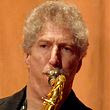Jazz from a couple of saxophonists: Bob Mintzer and Lou Caputo lead bands on the mid- to full-size spectrum
 |
| Bob Mintzer likes his Angeleno pals. |
Two such ensembles are Bob Mintzer's "All L.A. Band" (in a CD of the same title on Fuzzy Music) Lou Caputo's Not So Big Band's "Uh Oh!" (Jazzcat 47).
and
These well-recorded sets range over the possibilities of big-band jazz today. Mintzer, with credits both mainstream and on the edge of contemporary fusion (Yellowjackets), got a 17-piece group together to play compositions he wrote over a 40-year period.
 |
| Peter Erskine, "All L.A. Band" producer, recently played the Jazz Kitchen. |
There's a lot of flexibility in Mintzer's approach to the large orchestra. In "El Coborojeno," he favors punchy brass writing. Typically, he puts spaces into the lines he assigns the various sections, often to help add rhythmic juice to the funk grooves he gets going.
The Afro-Cuban timbral tapestry of trombone-trumpet-sax in "Ellis Island" is typical. That track also features an unconventional, engaging solo on baritone sax by Aaron Schroeder. I wish there was more information on who is soloing: I assume most of the fine tenor-sax outings are Mintzer's, but I'm curious who's responsible for the sizzling trombone solos on "Runferyerlife" and "Latin Dance."
 |
| The Not-So-Big Band plays a gig in Queens, N.Y. |
Scaling back a bit, comfortable arrangements by leader Lou Caputo, a sense of humor, and concise soloing make "Uh-Oh!" an amiable updating of the sort of mid-sized-ensemble charts we used to hear from Marty Paich and Manny Albam.
This is by no means a snoozy set, but if you must have consistent intensity in your jazz, look elsewhere. The Not-So-Big Band's take on "Stolen Moments" (a Ryan Krewer arrangement) is even more laid-back than Oliver Nelson's original, with a sensible yet florid vibraphone solo from Warren Smith to revel in. "News from Blueport," a bluesy mainstream number that NSBB bassist Bill Crow wrote long ago for the Gerry Mulligan Quartet, is fun to hear in the new version.
Caputo picks up the baritone, sounding like a deep-voiced version of Zoot Sims or Al Cohn, for a fine solo contribution to "If You Could See Me Now." He's elsewhere featured on alto and soprano saxophones and flute; he's an old-fashioned reed utility player writ large.
Women horn players tend to be underrated, so it's a pleasure to hear Virginia Mayhew on this disc. Her tenor solo on Mary Lou Williams' "Busy, Busy, Busy" (which Mayhew arranged), stands out among the six solos in the disc's lively finale. I found one of the longer tracks, "Ape and Essence," somewhat ho-hum. Otherwise, this is a clever, flavorful set by a refreshingly smallish ensemble (viz., the horns are three reeds, two trumpets, trombone, and tuba) with an abundance of joy to deliver.



Comments
Post a Comment